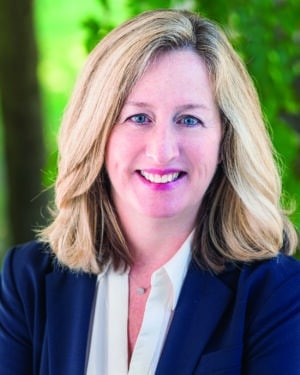Joan McGrath
Executive Director, PLAN of MA & RI
Age: 56
Industry experience: 30 years
People with disabilities face limits on how much they can spend without affecting their government benefits. But that does not mean they cannot save, inherit and invest money. Joan McGrath, executive director of the Planned Lifetime Assistance Network of Massachusetts and Rhode Island, wants banks, credit unions and others to understand that there are options for these individuals. A 501(c)(3) organization with offices in Needham and Providence, PLAN of MA & RI administers special needs trusts for people with disabilities, helping them avoid any impacts to their public benefits. The funds are pooled into investments, currently totaling $62 million, and managed by Connecticut-based Webster Bank.
McGrath worked as a public accountant before starting her own consulting firm. PLAN was one of her clients, and she ended up joining the organization as its director of finance 12 years ago. She became executive director in 2020, and the organization this year is marking its 50th anniversary.
Q: What are some of the financial services’ needs for this population?
A: People who have disabilities need to protect any assets they have. If somebody is on some sort of public benefit and they’ve inherited money, federal Medicaid limits how much money that you can have. A special needs trust lets people remain on benefits, but they can still have that money put aside for their sole benefit. Part of what we do is we organize spending plans for people in the trust. We help with disbursements from the trust funds. If you’re on certain public benefits, a trust can only be used to supplement things that are not covered by public benefits. We help you navigate that.
Q: What are some challenges these individuals face with their money?
A: There are some studies that have been done with people that have special needs, and it costs them roughly 28 percent more for daily living compared to a person that does not have that challenge. Part of what we do is we help people get the services that they need to continue living – it might be in their own home, or it could be part of a nursing facility. We help them with the use of social workers to navigate those choices.
People that are over 65 can have a special needs trust only with a nonprofit such as us, but people that are under 65 have more choices about what kind of special needs trust they set up. Someone that’s over 65 and in a nursing care facility may have trust funds, but they’re not sure how they can spend them. The social worker will come in and help them decide. If you’re under 65, the social workers will go in and see how that person is living. Is it a clean, safe environment? Do they need air conditioning? Do they need somebody to come in and work with them daily? Do they need occupational therapy? Do they need something that is not being addressed? That’s what makes us different than other trusts.
Q: Does PLAN employ the social workers?
A: We’re unique in that. Most special needs trusts do not have social workers on staff. We actually have nine of them, soon to be 10. Our social workers are the primary contact with the disabled person, and then all of the disbursement and trust administration happens in our offices. Our bank does not speak directly with the beneficiaries, but they will answer any questions that may come up about someone’s investment or holdings or gains or losses, that sort of thing. We charge 3 percent annually, and the goal has always been that the trust funds earn more than the fees. We can’t promise that, but the goal is that the fees cover the trust administration, the social services piece and the investment piece.
Q: What role does Webster Bank have with PLAN?
A: We are the trustee, and they professionally manage the money for us. There are four investment strategies that are all on the conservative side, but some are not as conservative. It really depends on a person’s age, their condition, their needs, their wants. It’s all based on risk, and we work with Webster Bank on that.
Q: What can other banks and credit unions do to help this population?
A: The biggest challenge for this population or their families is that they don’t realize that they have options or that they need to do something. If someone is over 65 and they want to set up a special needs trust, they have no option except to join a nonprofit pooled special needs trust. I don’t think banks are aware that only a nonprofit can administer that type of trust. Most of our referrals come from attorneys who realize that.
If someone has money, they’re under 65, and they have a limited amount of money, they don’t realize that they can join a pool. There are so many children out there that have autism or some special needs, and grandparents don’t know how to help that grandchild without impacting their benefits. I think banks and credit unions just need to be aware that there is something like this out there. We’ve had actually a couple of big banks reach out to us and say, “This is exactly the kind of service that we need to know about so that when we do have one of these come across our desk, we can call you or suggest that they call you.” What I’ve tried to do is reach out to some of the bigger banks and let them know that we’re here.
Q: What challenges do you face?
A: I’ve been in this role as executive director for 18 months, and my number-one goal was to increase awareness of who we are and what we do. We’ve been in business for 50 years, and people have never heard of us. Since I took this role, I have now connected with other nonprofits to try and support their missions. That’s part of our mission: to support other organizations helping the same people with disabilities.
Five Countries McGrath Would Like to Visit
- Croatia
- Germany
- Greece
- Cuba
- Russia






